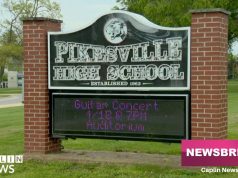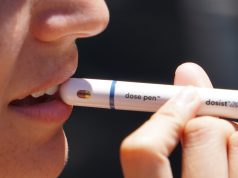Last weekend, Code for Miami, a computer programming group aims to solve governmental and social issues through coding, took part in the annual National Day of Civic Hacking. Top priority was helping ex-convicts register to vote.
This year, locals focused on Florida Amendment 4, which allowed people who had completed their sentences — except those convicted of murder or felony sexual crimes — to register to vote. The amendment passed in November 2018, potentially restoring voting rights to 1.4 million Floridians.
But then the state legislature passed a bill, S.B. 7066, that requires ex-felons to pay off any financial obligations they have — including court fees, restitution and the like — prior to having their voting rights restored.
Governor Ron DeSantis signed the bill into law in June. In a letter to Secretary of State Laurel Lee, DeSantis said the original amendment “restores – without regard to the wishes of the victims – voting rights to violent felons, including felons convicted of attempted murder, armed robbery and kidnapping, so long as those felons completed all terms of their sentences.” He then stated he believes this restoring of rights was a mistake.
Many activist organizations have criticized this, including the ACLU, which is fighting the law in court.
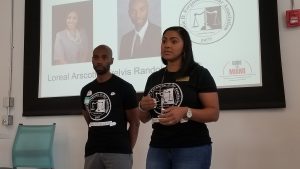
Greater Miami Chapter Secretary Mike Toth called S.B. 7066 “wealth-based voting, which is nakedly unconstitutional.”
Nicole Sinder, another representative for the Miami chapter, agreed. “We need to get the word out about this bill, which is wildly problematic. It puts up a language barrier, it’s a poll tax, and there are people who don’t even know they can register to vote, or think they automatically have the right,” she said.
Code for Miami’s Livio Zanardo said the goal of the event was to make it easier for those affected to take the steps to register and vote.
“Amendment 4 passed last year, but there’s a big knowledge gap, people don’t know where to go,” Zanardo said. “People ask, oh, where do we go for the resources, and we want to help and provide a way to make those resources known.”
Gail Woodley and Antonio Williams, canvassers for the New Florida Majority, a volunteer organization that encourages Florida citizens to vote, spoke about their own experiences. Woodley, who has had her own issues with the law, mentioned she still has a $250 fine, but still has the right to vote. She also mentioned that some people she has worked with don’t even know if they have any fees.
After the introduction, organizers worked on a “Journey Mapping,” during which attendees mapped out each step of the relationship between a user and a service. During each step, the actions of a user was listed, as well as any emotions they might feel.
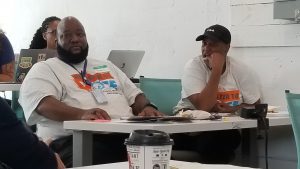
Audience participation played a major part in the process, highlighting each step ex-felons need to go through to get their voting rights back, while considering any hurdles they might come across. This included illiteracy, language barriers, conflict of information, lack of reliable government resources and hidden fees.
At about 1:30 p.m., the Journey Map was finished and attendees went to lunch for about an hour before starting their projects for the rest of the day.
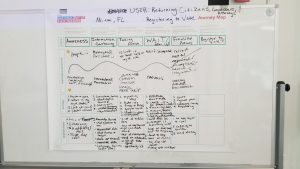
When participants returned, they broke into two groups. One filled out a usability scorecard, which answered questions on the current resources available to ex-felons as well as the steps in the overall process.
Another group began work on a website that put the relevant information in a single place, calling it a “Know Your Rights” site.
After a workshop on wire framing, or laying out the structure of the site, took place, teams broke off to work on aspects of the website. Code for Miami’s Julie Kramer said the group is continuing to develop the site.
The free event was hosted at Wyncode Academy. Stickers, pins, and food were available for attendees. In addition to Code for Miami leaders, representatives from the local chapter of the American Civil Liberties Union and the Wilkie D. Ferguson Black Bar Association addressed the group.



































